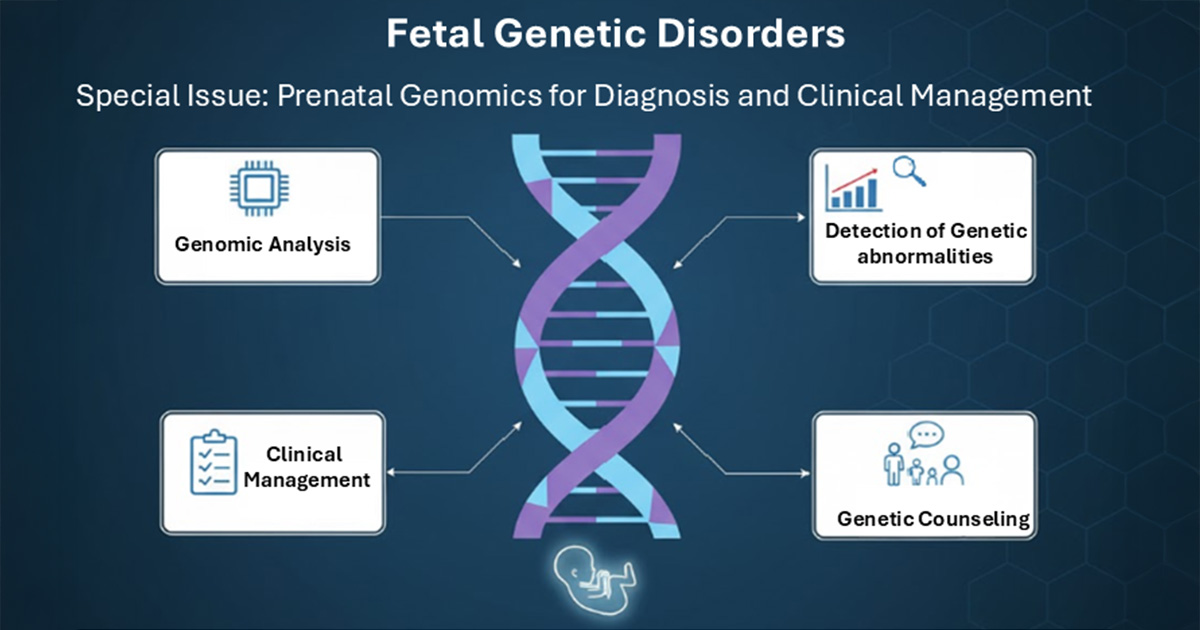- 2.8Impact Factor
- 5.5CiteScore
- 15 daysTime to First Decision
Fetal Genetic Disorders: Prenatal Genomics for Diagnosis and Clinical Management
This special issue belongs to the section “Genetic Diagnosis“.
Special Issue Information
Dear Colleagues,
In recent years, genomic technologies have profoundly improved our ability to investigate fetal genetic conditions. The identification and classification of pathogenic variants now represent a cornerstone for understanding the molecular basis of congenital disorders.
Aim and Scope:
This Special Issue aims to explore the diagnostic power of comprehensive genomic analysis in the prenatal setting. The focus is on how these approaches contribute to early and accurate detection of genetic abnormalities, supporting both clinical management and genetic counseling.
History:
Traditional cytogenetic and molecular tests have long been used in prenatal diagnosis, but their resolution and scope were limited. The introduction of genome-wide strategies has significantly increased diagnostic yield and broadened our understanding of prenatal disorders.
Cutting-Edge Research:
Current advances emphasize the integration of large-scale variant analysis, improved classification frameworks, and refined bioinformatic tools. These developments are leading to greater accuracy, faster turnaround, and deeper clinical impact in prenatal diagnosis.
The types of papers we are soliciting:
We invite original research articles, case studies, and reviews focusing on prenatal diagnosis through comprehensive genomic testing, variant interpretation, and translational applications. Studies addressing therapeutic perspectives, including in utero interventions and early postnatal treatments informed by genomic discoveries, are particularly welcome.
Dr. Katia Margiotti
Guest Editor
Manuscript Submission Information
Manuscripts should be submitted online at www.mdpi.com by registering and logging in to this website. Once you are registered, click here to go to the submission form. Manuscripts can be submitted until the deadline. All submissions that pass pre-check are peer-reviewed. Accepted papers will be published continuously in the journal (as soon as accepted) and will be listed together on the special issue website. Research articles, review articles as well as short communications are invited. For planned papers, a title and short abstract (about 250 words) can be sent to the Editorial Office for assessment.
Submitted manuscripts should not have been published previously, nor be under consideration for publication elsewhere (except conference proceedings papers). All manuscripts are thoroughly refereed through a single-blind peer-review process. A guide for authors and other relevant information for submission of manuscripts is available on the Instructions for Authors page. Genes is an international peer-reviewed open access monthly journal published by MDPI.
Please visit the Instructions for Authors page before submitting a manuscript. The Article Processing Charge (APC) for publication in this open access journal is 2600 CHF (Swiss Francs). Submitted papers should be well formatted and use good English. Authors may use MDPI's English editing service prior to publication or during author revisions.
Keywords
- prenatal diagnosis
- genomic testing
- NGS analysis
- variant classification
- pathogenic variants
- precision medicine
- fetal genetics
- clinical utility

Benefits of Publishing in a Special Issue
- Ease of navigation: Grouping papers by topic helps scholars navigate broad scope journals more efficiently.
- Greater discoverability: Special Issues support the reach and impact of scientific research. Articles in Special Issues are more discoverable and cited more frequently.
- Expansion of research network: Special Issues facilitate connections among authors, fostering scientific collaborations.
- External promotion: Articles in Special Issues are often promoted through the journal's social media, increasing their visibility.
- e-Book format: Special Issues with more than 10 articles can be published as dedicated e-books, ensuring wide and rapid dissemination.

